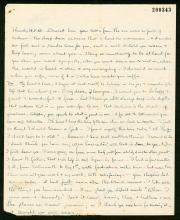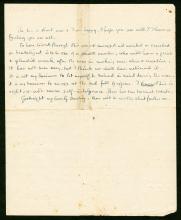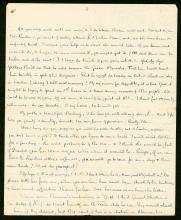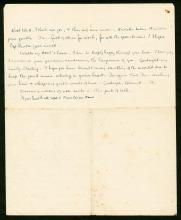BRACERS Record Detail for 19354
To access the original letter, email the Russell Archives.
"Thursday 29.8.18 Dearest Love, Your letter from the sea was so full of sadness—the deep-down sadness that is hard to overcome—" [continues] "Fri." [30 August 1918]. Most of the letter was written on the Friday.
Transcriptions of this letter: Thursday section: document .052440, record 99913; document .201140, record 116051, the last paragraph only of this document, text from document .200341, record 19352 preceding it.
Friday section: document .052441, record 99914, lacking some sentences; document .201141, record 116323, lacking the same sentences as document .052441.
There is also a literary version of this letter: ribbon copy, document .201165, record 116322; carbon copy, document .052402, record 99868. Both documents are numbered 55, p. 78 and signed with Russell's pseudonym initial "L". The letter contains only a few sentences from the first paragraph of the Friday section.
Letter 87
BR TO CONSTANCE MALLESON, 29–30 AUG. 1918
BRACERS 19354. ALS. McMaster
Previous Brixton letter, BRACERS 19352; next letter, BRACERS 116694
Edited by K. Blackwell, A. Bone, N. Griffin and S. Turcon
<Brixton Prison>1
Thursday 29.8.18.
Dearest Love, your letter from the sea was so full of sadness2 — the deep-down sadness that is hard to overcome — and it makes me feel such a tender love for you, such a wish to hold you warm and keep loving arms about you. I long so unutterably to be at hand for you when you need sympathy, when you want some one to rest in, when the world is hard and stern and very wearying. I do mind so much when you suffer, even if it is I who have made you suffer.
Fri. My heart’s Love, I begin at last really to believe in the joy and wonder of the life that lies ahead of us. O my dear, I love you. I want you to be happy and great and wonderful and free — but I know you will always keep in the depths that sadness that is in your letter from the sea — that sadness is the seal of greatness. Colette, you speak to what is great in me — and for all the littlenesses you have only toleration. Oh how I keep thinking of the time when we shall be together. I feel as though I should become a God — I found myself thinking today “Oh I hope I shall live to be old” — because I have such endless things I want to do. I don’t think you have any idea how entirely all that is due to you. When I first knew you I was going on from mere duty, not from vitality and instinctive zest. I have the feeling that real life is only beginning for me. I had a few months of it, from Falmouth to May 1st,3 with foretastes in earlier times — but even then there was not your work and my work, both satisfactory. — Your Shropshire Lad4 came today — it had just come when Miss Wrinch arrived. I like all the things you have marked — I am glad you didn’t mark “When I was one-and-twenty.” Isn’t it lovely having Clee and Ludlow5 and all the places we know coming in?6 Thank you 1000 times for sending it — it brought you very near.
The time is short now and I am happy. I hope you are well? I have a feeling you are not.
To have lived through this war and emerged not numbed or crushed or brutalized is to be one of a small number, who will have a great and splendid work after the war in making men alive and creative. It has not been easy, but I think we shall have achieved it. It is not my business to let myself be ruined in mind during the war — it is my business to emerge at the end full of vigour. I know this is right, and not mere self-indulgence. There has been too much waste.
Goodnight my lovely Darling. There will be another sheet further on.7
All goes very well with me now, and I do believe this time will end. I want to give Miss Rinder a present (costing about £1) when I come out, as she has been so infinitely kind. I want your help as to what she would like. If you know what would do, and happen to come across it, you might get it. (All such items can be taken out of the rent!) I love to think of your going into R.C. Yes, do dye Yellow Peril8 so that he will become the Green Monster. Tell him I will treat him kindly in spite of his disguise. But he must be ready on October 2.9 Shall we stay in London (incog) till next morning? My only reason for suggesting it is that I feel it might be trying to spend our 1st hours in a train among crowds of other people. We could be by way of going off at once, and really be quiet at R.C. I don’t feel strongly either way — do you decide. O my Love, to be with you — — .
My gentle and beautiful Darling, I do love you with all my strength. And I do love you gently and kindly, beneath the roughness of passion. Really I do.
How long do you suppose you will be able to stay out of London, assuming you don’t have a job? I think when you have to come back I will visit Ottoline for a few days — she will probably be by the sea — and I think she would be glad if I could give her some vague idea when it would be. Perhaps, if we can have the Rinders’ cottage10 after all, you would go to town for some days and then come back? What do you expect?
I do hope C.A. is not marrying C.E.M. I don’t believe he is. How good Elizabeth11 is! Do please tell her from me, when you see her, how much I am struck by her kindness, and how much affection I have for her. One has more as one knows her better.
I have seen Maurice’s controversy in D.N.12 I think the General Election is a dodge of Ll.G. to rivet himself on the Tories13 while he can. They would chuck him if they dared, but they can’t if there is an election in November.
Next Wed. I shall see you, and then only once more — 5 weeks today.14 It will be gone quickly. I am full of ideas for work, for all the years to come! I hope Exp. Theatre goes well.
Colette my Heart’s Love, I am so deeply happy through your love. I love you, I reverence your generous tenderness, the largeness of you. Goodnight my lovely Darling. I hope you have brought away something of the moonlit sea to keep the great music echoing in your heart. Imagine that I am stroking your hair and whispering gentle words of love. Goodnight, Beloved.
B.
Various matters of odd sorts in other parts of book.15
Is your health all right? Please let me know.
- 1
[document] This letter was edited from the initialled, two-sheet, twice-folded original in BR’s handwriting in the Malleson papers in the Russell Archives. Both sheets were folded so that the bottom half of the versos formed blank exteriors to add a measure of privacy to the contents.
- 2
Your letter from the sea was so full of sadness The letter that Colette wrote from St. Margaret’s Bay on 25 August 1918, at least in her edited version of it (the original having been lost), was sad only with reference to “past ache and pain”. It was just the opposite. She wrote: “I’ve treasured these few days rest from past ache and pain, and the longing and the waiting. I’m looking with hope and joy to the day we’ll go out into the world together, my Beloved” (BRACERS 113153). However, she may have edited the contents of the original.
- 3
from Falmouth to May 1st That is, from January 1918, when Colette returned from filming The Admirable Crichton in Falmouth, to the date of BR’s entry into Brixton.
- 4
Shropshire Lad A.E. Housman, The Shropshire Lad (1896), a book of poetry about the land and rural life of a locale favoured by Colette and BR. She sent him the reprint by Grant Richards in 1915 and inscribed it “C.O’N Scarborough June 1918.” (The copy was left by her to Phyllis Urch; she in turn gave it to John Wilson Foster, from whom it was acquired by McMaster.) The collection’s “When I Was One and Twenty” is a famous poem about the folly of giving your heart away. Housman (1859–1936) taught classics at Trinity College when BR lectured there. A 1913 letter from Housman to Alice Rothenstein (The Letters of A.E. Housman, ed. Archie Burnett [Oxford: Clarendon P., 2007]) records a brief conversation with BR. Housman considered BR’s departure from the College “a great loss”, but in 1919 he would not support his return because of BR’s “taking his name off the books of the College” (ibid., 1: 399).
- 5
Ludlow BR and Colette stayed at the Feathers Inn in Ludlow, Shropshire, on the second night of their idyllic August 1917 vacation before moving on to Ashford. See S. Turcon, “Then and Now: Bertie and Colette’s Escapes to the Peak District and Welsh Borderlands”, Russell 34 (2014): 117–30.
- 6
and all the places we know coming in? Other places (besides Clee and Ludlow) they knew that are mentioned in The Shropshire Lad are the River Teme and Knighton.
- 7
another sheet further on. In the book in which the present sheet had been concealed. The second sheet begins “All goes very well with me now”.
- 8
Yellow PerilColette’s dressing gown.
- 9
October 2 The date BR expected to be released early from Brixton.
- 10
Rinders’ cottageMiss Rinder offered her family’s cottage as a place to stay once BR left prison. Windmill Cottage was in Icklesham, near Winchelsea. Although not on the coast, it was not far away.
- 11
Elizabeth Elizabeth was going to let Wrinch occupy the Attic and Elizabeth would pay the rent.
- 12
Maurice’s controversy in D.N. The Liberal Daily News, which held the Prime Minister and the Coalition Government he led in rather low regard, had derided Maurice Elvey’s forthcoming opus, The Life Story of David Lloyd George (in which Colette had declined to act [Letter 59]), as a mere “General Election film” (“Under the Clock”, 26 Aug. 1918, p. 4). As quoted in the same unsigned column the next day, an evidently outraged Elvey insisted that there was “no political object” to this wholly artistic enterprise, which provided an “impartial” treatment of its subject’s life (p. 4). The Daily News, however, remained unconvinced by the director’s protestations. Ideal Film also reacted to suggestions that their project was a carefully timed piece of election propaganda, emphasizing that the screenplay had been written by a professional historian (Sir Sidney Low) and that the producers had received “not a penny in the way of subvention … from public or quasi-public funds” (“Mr. Lloyd George’s Life on the Film”, The Times, 27 Aug. 1918, p. 9). But the company would shortly receive a £20,000 payment (almost certainly from a government source) in exchange for the print and negatives, which resulted in the film being withheld from release. When it was rediscovered almost 80 years later, the film was in the possession of Lloyd George’s grandson Lord Tenby. Whether unfounded or not, suspicions that the production was a “political stunt” (Daily News, 30 Aug. 1918, p. 4) may have given the Prime Minister — already confident about his electoral prospects — cold feet about a venture he seems at one time to have favoured. He might instead have been seeking to distance himself from a lawsuit brought by Ideal Film against the popular jingoistic weekly, John Bull, which had published damaging insinuations about the national origins of the company’s founders, Harry and Simon Rowson, who were of Russian-Jewish descent (see Sarah Barrow and John White, eds., Fifty Key British Films [London and New York: Routledge, 2008], pp. 8–9). After careful restoration by the Welsh Film and Television Archive, The Life Story of David Lloyd George finally premiered in Cardiff in 1996 to belated critical acclaim.
- 13
General Election … dodge of Ll.G. to rivet … Tories As intimated by the preceding note, a general election was rumoured to be imminent in the late summer of 1918. Ultimately, however, Parliament was not dissolved until after the Armistice. But the qualms of the political opposition about a wartime election were hardly removed by holding one in its immediate aftermath, on 14 December 1918, when the Liberal Prime Minister and his Conservative allies (onto whom, effectively, Lloyd George had been “riveted” ever since his accession to the premiership) achieved a huge parliamentary majority.
- 14
Next Wed. I shall see you, and then only once more — 5 weeks today. I.e., 2 October, BR’s expected date of early release from Brixton. He was, in fact, let out earlier, on 14 September 1918.
- 15
other parts of book The book that contained smuggled letters.




